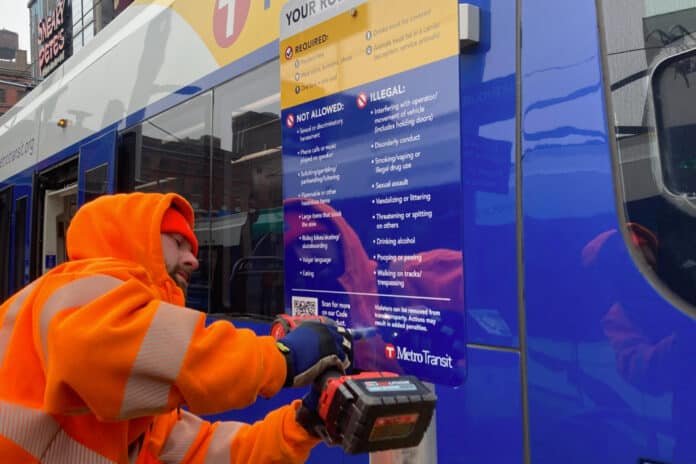
Metro Transit, which provides public transportation for the Twin Cities metro area, announced last week that it is installing new signs at light rail and bus transit stations which outline acceptable behaviors from riders.
“Signs outlining the expectations we have of riders are now being installed at light rail and bus rapid transit stations,” Metro Transit wrote in a post on social media. “Those who violate these rules will be removed from transit property.”
Signs outlining the expectations we have of riders are now being installed at light rail and bus rapid transit stations. Those who violate these rules will be removed from transit property. 👀
Review the rules here: https://t.co/VfYrdqp9BV pic.twitter.com/CaiS5lYaps
— Metro Transit (@MetroTransitMN) January 24, 2024
A webpage dedicated to “Rules for Riding” explains a person’s obligations as a rider. “Transit vehicles and facilities are shared spaces, and come with shared responsibilities. Your role as a rider applies anytime you use the transit system, and ensures a clean, safe experience for all,” the website says.
The expectations of riders include paying ride fare and wearing clothing. Paying for one fare equals paying for one seat, Metro Transit explains, telling riders to hold their belongings in their laps and not place them on an additional seat.
The rules distinguish illegal activity from activity that isn’t necessarily illegal but is “not allowed.”
Peeing and pooping while riding on Metro Transit vehicles falls under the “illegal” category, according to the signs. “Transit property is not a public restroom,” the new rules read. They also explain to riders that sexual assault is illegal. “Sexual contact without consent is forbidden,” the rules state.
Other illegal behaviors include threatening or spitting on others, smoking and illegal drug use, drinking alcohol, and disorderly conduct.
Behaviors that Metro Transit says are not allowed include solicitation and panhandling, using vulgar language, and “sexual or discriminatory harassment.”
Metro Transit riders shared safety concerns with lawmakers last March and testified to the high rates of “open drug use” on transit vehicles.
In September, crime on Metro Transit trains and buses was reportedly up 22% over 2022 and 50% over 2021, according to the Center of the American Experiment.
The new rules are part of a code of conduct adopted by the Metropolitan Council on Dec. 13. The Minnesota Legislature’s 2023 transportation bill required the Metropolitan Council, which oversees Metro Transit, to adopt a rider code of conduct for public transit and display this code at Metro Transit stations. The bill also authorizes transit officials to remove passengers from trains or buses if they are violating the code of conduct.
“Although we have had code of conducts in the past, this is something of greater urgency,” Board Chair Charlie Zelle said at the December meeting. “We can’t underscore [enough] the idea of putting a stake in the ground of what’s acceptable and what’s not. So much of what’s occurring, particularly on our light rail system, is not acceptable.”









